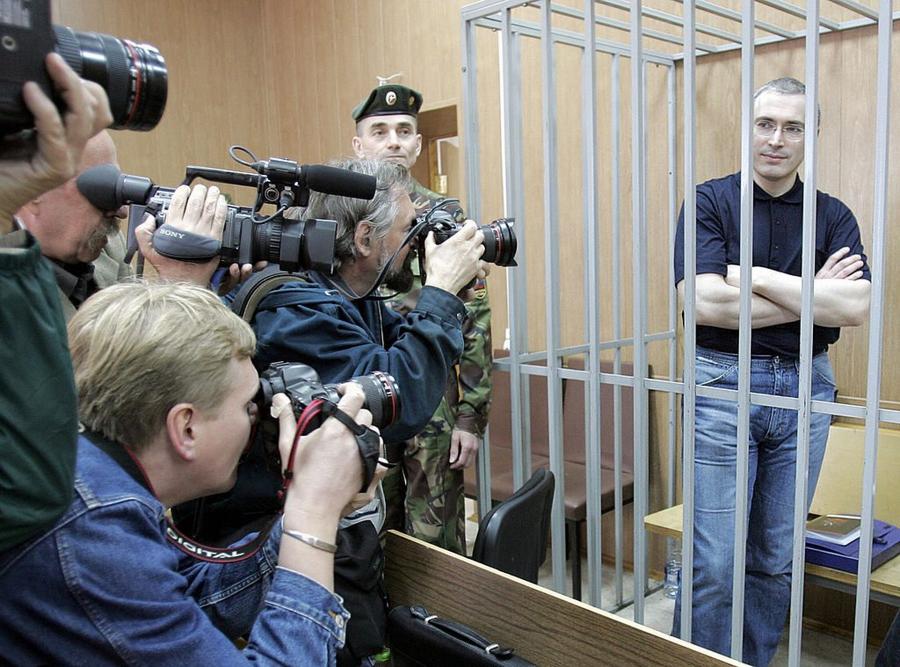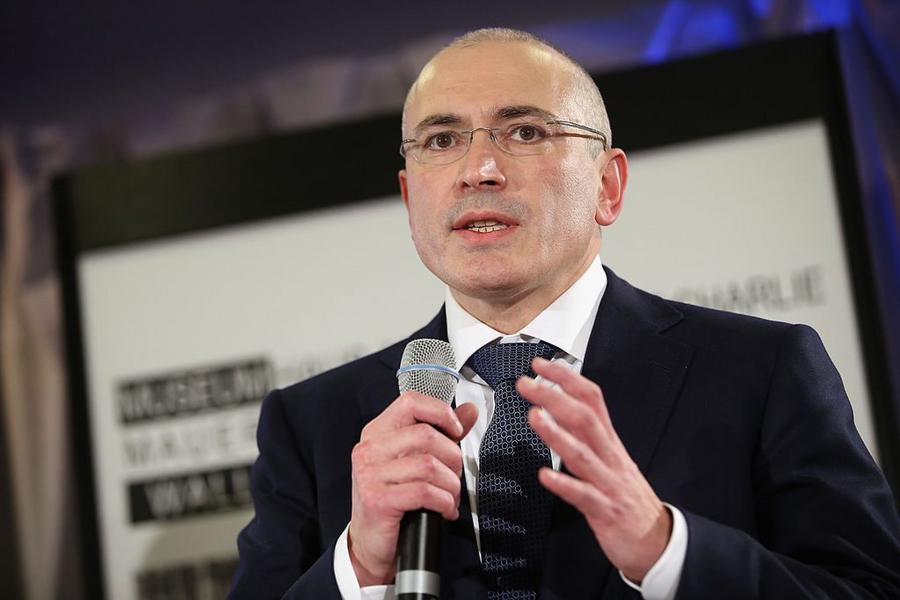Picture this: The year is 2003, and you're the richest person in Russia and the 16th richest person in the world thanks to your $15 billion net worth. One day, you wake up feeling pretty good about life. The very next day, you wake up in a Siberian prison.
You stay in that prison, not for a week or a few months. You rot there for the next 10 years.
During that horrible decade, your wealth evaporates into the hands of your arch enemy. Sound too unbelievable to be a true story? It almost sounds like a really bad nightmare. Well, unfortunately, this is exactly what happened to former Russian business tycoon Mikhail Khodorkovsky. His only crime? He dared to be a capitalist and was a vocal critic of Vladimir Putin…

Mikhail Khodorkovsky / TATYANA MAKEYEVA/AFP/Getty Images
The Rise of a Reluctant Capitalist
Mikhail Khodorkovsky was born on June 26, 1963, in Moscow to two chemical engineers. Raised in a modest two-room apartment, he showed early signs of ambition. As a student, he joined the Communist Youth League (Komsomol) and began importing computers under its banner, exploiting a loophole that allowed him to convert administrative rubles into cash. In 1986, he earned a degree in chemical engineering from the Mendeleev Moscow Institute of Chemistry and Technology.
With Mikhail Gorbachev's perestroika reforms came opportunity. In 1986, Khodorkovsky opened a small café.
A year later, he co-founded Bank Menatep, one of Russia's first private banks. He used the bank to fund import-export ventures and amass capital while the old Soviet guard still viewed entrepreneurship as suspect. As he would later recall:
"Many years later I talked with people and asked them, why didn't you start doing the same thing? Why didn't you go into it? Because any head of an institute had more possibilities than I had, by an order of magnitude. They explained that they had all gone through the period when the same system was allowed. And then, at best, people were unable to succeed in their career and, at worst, found themselves in jail. They were all sure that would be the case this time, and that is why they did not go into it. And I" —Khodorkovsky lets out a big, broad laugh at the memory — "I did not remember this! I was too young! And I went for it."

Mikhail Khodorkovsky / Sean Gallup/Getty Images
The Yukos Windfall
Khodorkovsky's major breakthrough came in the early 1990s. During Russia's chaotic transition to capitalism, state assets were sold off at fire-sale prices. He used Menatep to acquire shares in dozens of companies. In 1995, Menatep acquired the debt-ridden oil giant Yukos for just $300 million, while taking on $3.5 billion in liabilities.
It was a stunning deal. Yukos, anchored by Siberian oil fields, quickly became one of the largest and most profitable companies in post-Soviet Russia. Under Khodorkovsky's leadership, it modernized operations, boosted output, and attracted foreign investment. By the early 2000s, Yukos was pumping more than a million barrels of oil per day.
Khodorkovsky's fortune soared. By 2004, his empire gave him a net worth of $15 billion. That made him the richest person in Russia and the 16th richest person on earth. Life was good. But his growing wealth—and growing independence—was making the Kremlin uneasy.
Crossing Putin
Unlike many oligarchs who kept a low profile, Khodorkovsky spoke openly about corruption in Russia. He funded opposition political parties and independent media. In February 2003, during a televised meeting at the Kremlin, he confronted Vladimir Putin directly, accusing senior officials of taking bribes. It was a bold move—and a fatal one.
On October 25, 2003, Khodorkovsky was arrested aboard his private jet at a Siberian airport. Officially, he was to be questioned as a witness. In reality, he was charged with tax evasion, fraud, and embezzlement. The state quickly froze Yukos's shares and launched a campaign that gutted the company's value.
In 2005, Khodorkovsky was convicted and sentenced to nine years in prison. A second conviction followed in 2010 for embezzlement and money laundering. Critics and human rights groups widely viewed both trials as politically motivated.
A Fortune Lost
While Khodorkovsky sat in a Siberian labor camp, his empire was dismantled. Yukos assets were auctioned off—mostly to state-run oil giant Rosneft—and his personal fortune evaporated. In 2005, he transferred his remaining Yukos stake to longtime associate Leonid Nevzlin for an undisclosed sum. At that point, the shares were essentially worthless.
In 2013, after a decade behind bars, Khodorkovsky was suddenly pardoned by Putin and released just months before the Sochi Winter Olympics. He was flown to Germany and has lived in exile ever since.
In 2014, a group of Yukos shareholders, including Nevzlin, won a $50 billion arbitration award against the Russian state for the illegal seizure of the company. Khodorkovsky declined to participate in the suit and said he would not benefit from the judgment.
A Symbol of Risk
Khodorkovsky's downfall remains a chilling precedent in Russia's modern history. His arrest sent a message to other oligarchs: Stay out of politics, or risk losing everything. His story gained new relevance in July 2025 when Russian billionaire Konstantin Strukov— net worth $2 billion— was caught attempting to flee the country on his private jet. His assets were frozen and his passport canceled amid a Kremlin-driven nationalization effort.
As Khodorkovsky himself once joked, the only reason he built an empire in the first place was because he didn't remember what had happened to others before him.
/2014/08/GettyImages-458847397.jpg)
/2015/07/boris.jpg)
/2016/08/GettyImages-99988722.jpg)
/2016/09/GettyImages-450539235.jpg)
/2019/02/Bill-Browder.jpg)
/2009/11/George-Clooney.jpg)
/2009/09/Brad-Pitt.jpg)
:strip_exif()/2015/09/GettyImages-476575299.jpg)
/2018/03/GettyImages-821622848.jpg)
/2019/11/GettyImages-1094653148.jpg)
/2020/04/Megan-Fox.jpg)
/2020/01/lopez3.jpg)
:strip_exif()/2009/09/P-Diddy.jpg)
/2020/02/Angelina-Jolie.png)
/2020/06/taylor.png)
/2009/09/Jennifer-Aniston.jpg)
/2019/10/denzel-washington-1.jpg)
/2009/09/Cristiano-Ronaldo.jpg)
/2019/04/rr.jpg)
/2017/02/GettyImages-528215436.jpg)